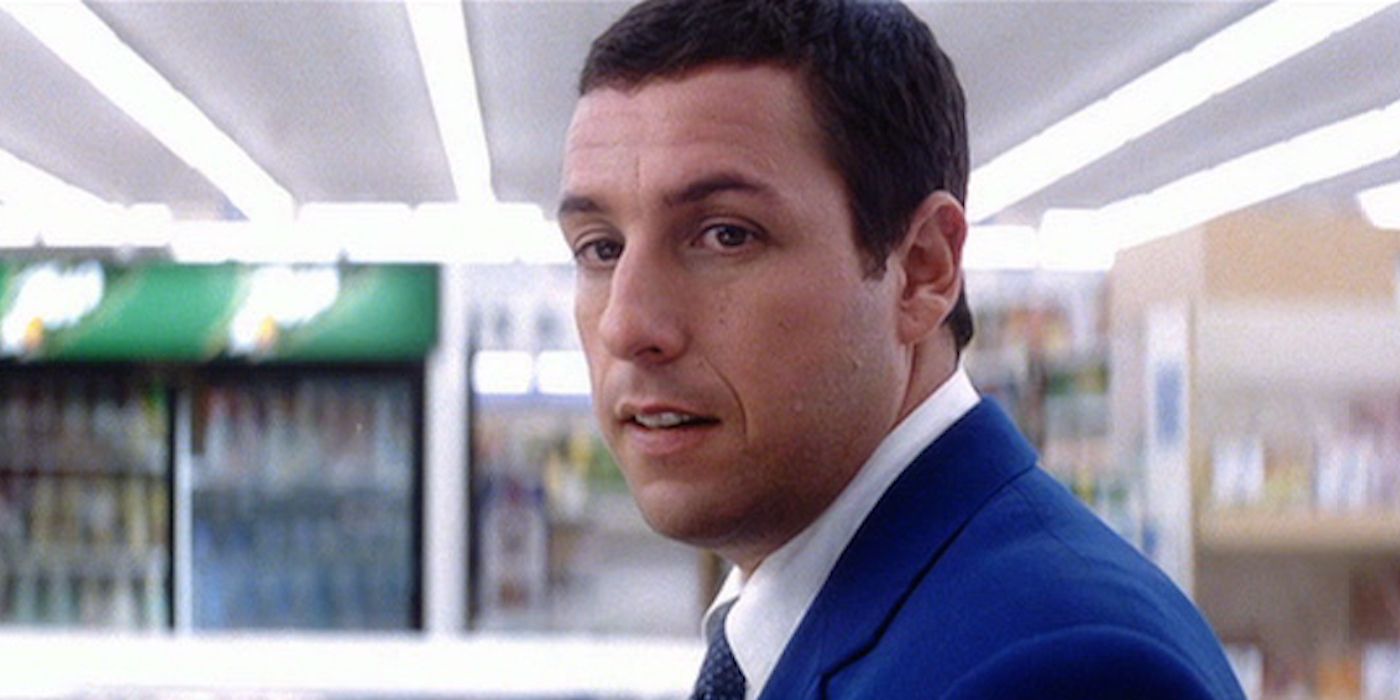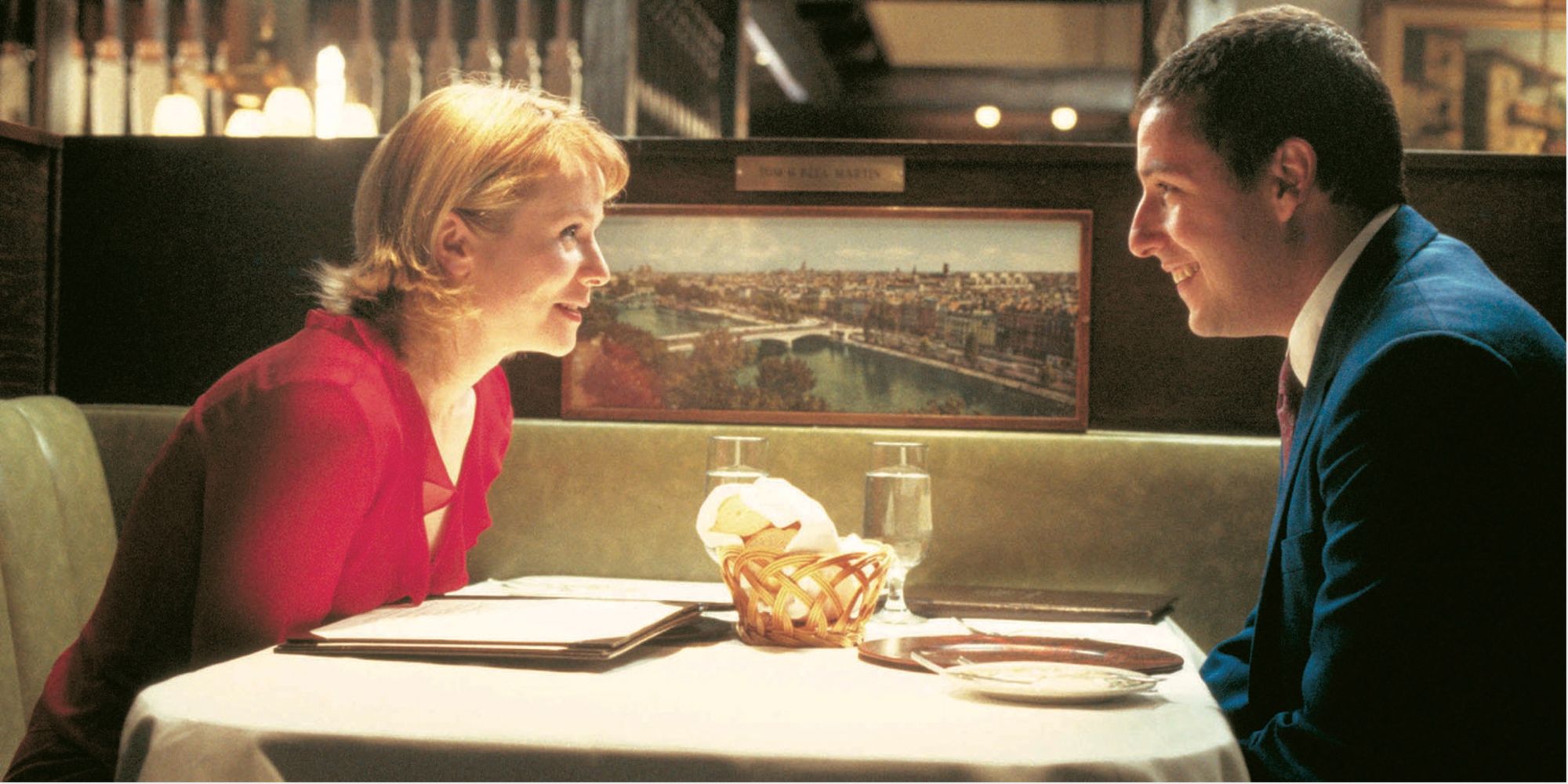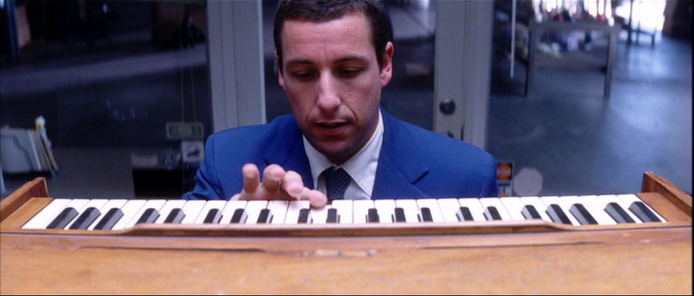When it was announced in 2000 that Paul Thomas Anderson had cast Adam Sandler as the romantic lead in his film Punch-Drunk Love, critics everywhere were shocked. Even Sandler himself admits he was skeptical of the choice, thinking he would ruin the movie. However, Anderson’s instincts proved to be razor-sharp for the tone of this unconventional rom-com.
Punch-Drunk Love follows Barry Egan (Sandler), a socially awkward toilet plunger salesman who spends his days trying to avoid abuse from his sisters at work, but finds his mundane routine turned upside down when he meets the captivating Lena (Emily Watson). Sandler could’ve fallen into the trap of playing just a one-dimensional, lonely man who occasionally gets angry about his inability to find love. However, everything from his vulnerable expressions to his fast-paced, sometimes repetitive delivery create an unpredictable performance, and one that transcends a multitude of rom-com clichés. While much of the unique, complex traits of Barry’s character can be attributed to Anderson’s writing, it’s Sandler’s genius performance that shatters all expectations.
Often in rom-coms, one of two types of personalities within male leads emerge: either the loud, extroverted charmer, such as charismatic politician Chris Marshall (Ralph Fiennes) in Maid in Manhattan, or the introverted, hopeless romantic, like Rick Blaine (Humphrey Bogart) in Casablanca. The latter is often brooding and mysterious, but just like the extrovert, has a quick wit and a smooth way of talking to his love interests. Through Sandler’s intriguing performance, he doesn’t seem to fall under either category, and instead brings an unprecedented character to the table.
Throughout the film, Sandler’s fast-paced, often monotonous delivery feels like a stream-of-consciousness way of talking. As the audience gets to know Barry, it becomes evident that the reason he speaks too quickly is that he’s extremely nervous about the way he presents himself to people. In an early scene, when he tries to chat to his brother-in-law Walter (Robert Smigel) he mistakenly says “Business is very food” instead of “good.” When his sister Elizabeth (Mary Lynn Rajskub) calls him out on it, Barry attempts to crack a smile and laugh it off. However, Sandler quickens his dialogue pace and shifting of his body uncomfortably, emphasizing the consuming fear that Barry has with social interaction. As Barry’s character is set up in the first act, Sandler makes Barry’s sense of internal frustration feel visceral. When he’s being verbally abused on the phone by his sisters, Sandler could’ve chosen to push back and indicate explicit annoyance. Instead, he sits there and takes it, his often blank expression weakening as he tries to fight through his pain. He diverts from the typical male lead who might just be plainly awkward. Sandler’s Barry is not just socially awkward, he’s sunken his character into his own pain like a pit he’s unable to dig himself out of.
Moreover, when Barry speaks, his eyes dart around as he avoids direct eye contact with whoever it is he’s addressing, highlighting the immense difficulty he has with vulnerability. One of the most interesting examples is when he’s on his first date with Lena, and he tells her a joke. Throughout every beat of the set-up and punchline, Barry stares directly down at his plate. He speaks quickly, like there’s not a single period in between sentences. This is far from the typical, slow, measured delivery of a charming lead in a classic rom com. This intense lack of vulnerability, and, as Barry admits in an earlier scene, self-loathing, is incredibly rare in romantic leads. Sandler pushes the boundaries of Barry’s discomfort in these first moments, making for a character whose loneliness you can start to feel radiating from the screen.
Another common cliché that is found in many rom-coms is that the lead often is explicitly desperate for love. Indeed, they attempt time and time again to find it, going on multiple dates, sleeping with different people, and making gestures, often to no avail. For example, middle-aged bachelor Cal Weaver (Steve Carell) in Crazy, Stupid, Love embarks on a journey of sex and romance with multiple women, often vying for their affection, before he realizes he’s still in love with his ex-wife. However, what’s interesting about Barry is that, as the film progresses, it becomes clear that while he does need love, he makes no attempts at the beginning to find it. Beyond this, Sandler’s performance creates another subtle layer to Barry, which is that he actively avoids the prospect of intimacy.
From the very first sequence, it’s apparent that love is not a part of Barry’s life. Not only does Anderson frame him to make him look extremely isolated, Sandler amplifies this in the way Barry speaks. When Elizabeth tells him that she has an attractive, nice friend who might come to the dinner party that night, Barry simply says, “Yeah! I don’t wanna do that.” As his sister grills him, and as he tries to come up with excuses as to why he can’t attend, Sandler’s body language starts to change. He puts his hands on his hips to try to stand his ground, but his furrowed eyebrows make him appear frightened and concerned. This begins to make it obvious that the reality of a woman in Barry’s life is utterly terrifying. In a later scene, when he attends the dinner and asks Elizabeth, “Where’s your friend?,” there’s a slight moment where it seems like Barry might’ve been interested in meeting her. However, when Elizabeth tells him she couldn’t make it, without hesitation Barry responds, “Thank you!” On the surface, he avoids love, but through his delivery it becomes clear that inside, he craves it. He can’t simply search for love, however, he first must fight this urge that he has of avoiding intimacy. It’s the constant dichotomy within Sandler’s performance that illustrates Barry’s internal conflict, and diverts from the overdone male lead who simply wants love.
This idea connects to another cliché which Sandler moves beyond in the film. Often in rom-coms, there are two types of conflict that stand in between the love interests. If it’s not “hate at first sight” such as the memorable opening of When Harry Met Sally, it’s love at first sight, in which case there’s a problematic, external obstacle standing in their way (in Notting Hill, she’s a famous Hollywood actress, and he’s a complete unknown.) Conversely, the only obstacle standing between Barry and love is himself. While Sandler could’ve gone the simple route of portraying Barry as simply avoidant of Lena until he’s not, there’s a much more interesting push and pull within his character.
As soon as Barry sees Lena approaching him for the first time, he starts drinking his coffee almost uncontrollably. When Lena gets closer to him, he nearly darts for the nearest exit. While Sandler could’ve played this in a goofy, over-the-top way, he ensures that Barry looks like he’s trying to play it cool. Moreover, in Barry’s first words to Lena, he repeats his sentences and looks out at the distance like he’s got somewhere to be. It’s a subtle, funny scene that completely shatters every idea of a “meet-cute”. In a later scene, Lena returns to his workplace and asks him if he remembers her. Similarly to their first meeting, he tries to play it cool by saying “Yes I do!”, but his delivery is in the most bizarre, sing-songy voice. This shift between trying to be indifferent and trying to be appealing feels more authentic than the impossible charm of most clichéd romantic leads. Only someone with a strong comedic sentiment like Sandler could have achieved the endearing nature of each of Barry’s scenes.
Lastly, a major cliché seen in rom-coms is that of the big, extravagant gesture. Often, these gestures are placed towards the end of a film, after the male lead has lost the girl and is desperate to get her back, such as when Alex (Hugh Grant) sings Sophie a song at a concert in front of thousands in Music & Lyrics. Barry’s version of this is entirely different, and Sandler’s unique performance amplifies his bizarre form of affection with Lena. The first moment that this is highlighted is when Barry follows Lena to Hawaii, and the two of them sleep together for the first time. When they’re in bed, Barry’s rage and bouts of violence with windows manifests into love for Lena. Sandler lowers Barry’s voice as he gently tells her he wants to “Smash her face because she’s so cute”, and she immediately responds: “I wanna chew your face, scoop out your eyes, and eat them.” It becomes clear at this moment that Barry and Lena are parallels because of how unconventional their affection towards each other is. Moreover, through Sandler’s gentle nodding and careful tone, he’s hit with the realization that he has found someone who speaks his language. It’s far from any moment of a classic romantic male lead’s way of communicating love.
When Emily is hit by a car and ends up in the hospital, Barry makes the mistake of leaving her there, indicating their “separation” scene, which is a critical element of any rom-com. When he later finds her and apologizes, they kiss. In a clichéd film, this kiss might’ve been his redeeming moment, or perhaps his final, big gesture. However, immediately after they kiss, Barry sinks his head in her arms and starts crying. This intense vulnerability is almost unheard of in romantic male leads. Sandler amplifies the weirdness by heightening his own awkwardness within the scene. This further shatters the hypermasculine cliché that has become so repetitive in the romantic genre.
Punch-Drunk Love cemented Sandler as a truly versatile actor. In every awkward body movement and every repetition of his words, Sandler completely embodies Barry, never once showing his vulnerability until the film’s final moments between him and Lena. It’s hard to imagine this film without Sandler bulldozing through each romcom cliché with his oddball humor and unusual charm. Perhaps there’s another Anderson-Sandler collaboration on the horizon, and if there is, it’ll be fun to revisit their roots in this charming story.
























































![Key Metrics for Social Media Marketing [Infographic] Key Metrics for Social Media Marketing [Infographic]](https://www.socialmediatoday.com/imgproxy/nP1lliSbrTbUmhFV6RdAz9qJZFvsstq3IG6orLUMMls/g:ce/rs:fit:770:435/bG9jYWw6Ly8vZGl2ZWltYWdlL3NvY2lhbF9tZWRpYV9yb2lfaW5vZ3JhcGhpYzIucG5n.webp)




















